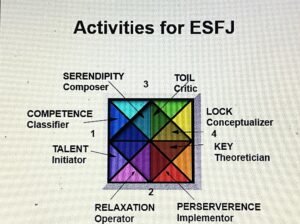Extended ESFJ Profile


ESFJ stands for extroverted sensing feeling judging. This personality type is closely related to the ESFP except for their preferred way of dealing with the world. An ESFP prefers to gather data. An ESFJ would rather make a decision. The Competence portion of the Work mode of the ESFJ has the transactional role of Classifier. Its corresponding ministry role is Evangelist.
CLASSIFIER
The Classifier is one who makes choices between dichotomous situations of control. In a literal sense, this is concerned with control of the body. Thus some classifiers are athletes. Lowen gives the example of a baseball player, who must decide if a pitch is in the strike zone and how to control his body to hit the ball. However, another prime example of a Classifier is the politician. The politician is constantly choosing what action to take. Shall I vote yes or no? Shall I accept this invitation or go to that banquet? Shall I endorse this candidate or denounce that project? Shall I shake hands or smile for the photo opportunity? Administrators are also Classifiers. They must make decisions of control all the time.
EVANGELIST
I have mapped the ministry role of Evangelist to correspond with Classifier. The Evangelist is, with the apostle Paul, wondering how to control the situation to help move people from one category to another. What can I do to help the lost become found; the dead in sin come to new life? Shall I cross over to Macedonia or stay in Judea? Shall I speak in Madison Square Garden or Central Park? Shall I talk about your life or speak of Biblical characters? The Evangelist has a good track record for getting the right answers to these control questions. In many respects, a good Evangelist is a good politician. It is not surprising to find Billy Graham, Jerry Falwell, and Pat Robertson crossing those church and state lines. The Talent portion of the Work mode for the ESFJ consists of the transactional role of Initiator and the ministry role of Ministry Leader in the Community.
INITIATOR
The Initiator is an entrepreneur and an opportunist. Lowen uses the sentence “Signal the Match.” to describe this role. The Initiator is watching for a match. Lowen’s prime example is a salesperson. What is it about the customer that matches the product? When the salesman gets the answer, he signals the match and says, “This is just the one for you!”
MINISTRY LEADER IN THE COMMUNITY
Often it takes an entrepreneur to be a Leader of Ministry in the Community. Not everyone is ready to trust across denominational or other faith lines. The Ministry Leader in the Community is able to find the match between the needs of the community and the desires of the people to help. He then raises the flag and presto, others say “This is the project we have been seeking!”
The ESFJ Evangelist might be someone who comes up with a catchy evangelistic campaign. They might think up something like “Come Home to the Father for Father’s Day”. Then he might get all the churches in the neighborhood to cooperate to invite fathers to church.
The Play mode of the ESFJ has as its Perseverance portion the transactional role of Implementor and the ministry role of Peace and Justice Worker.
IMPLEMENTOR
An Implementor is someone who sorts out the routines of life. Lowen tells us that he almost called this transaction engineer. The engineer uses the routines he or she knows regarding speed, stress, temperature, etc. to create a machine or build a rocket. As with other roles we have discussed, the Implementor can also be focused upon more abstract things. The Implementor makes a good administrator, who can mesh all the routines of an organization into a smoothly running whole.
PEACE AND JUSTICE WORKER
The distinction between this ministry role and Social Justice Program Developer seem slim. However, the Developer is more likely to create a new program, whereas the Peace and Justice Worker will execute an existing program. The Program Developer, using his organizing skills, might bring several churches and or organizations together to fight discrimination in the city. However, once a plan is in place, the extroverted Implementor is better able to work the pieces of the system to get results.
Since this is the Perseverance portion of the Play mode for the ESFJ, we might expect him to be tireless in his efforts to implement the goals of their entrepreneurial evangelistic projects. Perhaps, the interest in peace and justice issues might add a particular flavor to the evangelistic efforts.
The Relax portion of the Play mode of the ESFJ includes Operator for a transactional role and a ministry role of Be Jesus as the Church.
OPERATOR
Like the role of Molder, the Operator is foremost a hands-on activity. The Operator might operate a word processor, a scalpel, or a socket wrench. Also, like Molder the Operator can operate people, institutions, or ideas, as well as things. He might be a store manager or a policeman, as well as secretary or surgeon. The Operator can read the environment and then act upon it. The environment might be a gang fight or car engine.
BE JESUS AS THE CHURCH
In this ministry mode, the environment is the church and its surroundings. Here the Operator’s tool is not a scalpel or a wrench, it is the church! This type asks: How can I use the church building to minister to the kids down the block? How can we use the choir to minister to Nursing home across the street? How can the church be Jesus? The contrast between this and Making the Church be Jesus is one is focused on changing the church to make it more like Jesus. The other is focused on using the church as it is to be Jesus now!
You can see how these roles might play themselves out in our hypothetical evangelist, who is implementing a special Father’s Day evangelistic effort among a group of local churches. He is having a fun, relaxing time, implementing his or plan, to have the Church be Jesus by inviting people to come home to the Father!
Critic with its corresponding ministry role of Worship Evaluator/Planner make up the toil portion of the challenge mode for the ESFJ.
CRITIC
This role is involves very astute, critical listening, with exacting interpretation that notes the differences in meanings in words like lied, falsified, distorted, misinterpreted, and misunderstood. The exacting nature is typical of detailed transaction. This transaction is vital to many professionals, including speech therapists, voice coaches, theater critics, political analysts, interviewers, copy editors and opera singers. This transaction prefers to listen rather than speak.
WORSHIP PLANNER/EVALUATOR
Worship is in many ways a divine drama. The choice of words is important. How and when, they are spoken is important. The nuances of their theological implications are important. The mood they create or destroy are important. It is important to have a ministry role to help make these decisions.
Let us again observe our imaginary evangelist. Preparing the actual joint service to kick off this special “Come Home to the Father” crusade will seem the most like real work to the ESFJ. That is, in the sense that we generally use the term, rather than in the manner than Lowen uses it. In other words, it will be somewhat difficult and tiresome. However the Serendipity aspect of the task may serve to make it more enjoyable. It won’t be something the ESFJ does all the time. The serendipity portion of the ESFJ Challenge mode has the transactional role of Composer and its corresponding ministry role of Apologist.
COMPOSER
The Composer role harmonizes the combinations. This could be words in a poem or couples at a dinner party. This role is alert to issues of human sensitivity, and issues of spirituality. They often gravitate to the professions of counseling and psychology, as well as the arts.
APOLOGIST
Composers are looking for the harmony in combinations. The ministry role of Apologist is one that attempts to help the culture outside of Christianity, find a point of contact with the faith. The apologist is a defender of the faith. He or she helps the outsider understand and even come to accept the faith as both reasonable and good. C.S. Lewis used his Composing role presents Christianity as reasonable, good, and true understandings of life.
The ESFJ evangelist, who is hypothetically preparing this special event, will be seredipitously using his or her composing skills. Not only might he or she write a special prayer or two, but the whole process might be seen as composing an event!
The Creativity mode for the ESFJ includes in its Lock position the transactional role of Conceptualizer with its corresponding ministry role of Promoter of Discipleship. The Creativity mode contains for each type its hidden agenda. The Evangelist may talk saving souls, but underneath he is really more interested in making disciples!
CONCEPTUALIZER
Conceptualizing involves visual information processing. This role finds structure in logic. Professions such as architecture and systems design use the conceptualizer role.
PROMOTER OF DISCIPLESHIP
A discipline is a structured approach to living. The Conceptualizer may want to innovate new systems, but he would like others to follow them. They have drive toward constant improvement of everything. These are the ‘better idea’ people of the topological world. Everything – words, plans, designs, ideas, even people- has room for improvement. The Promoter of Discipleship is interested in making better Christians.
The Key portion of the Creativity role for the ESFJ includes the roles of Theoretician and Theologian.
THEORETICIAN
The Theoretician finds the pattern in strategies. This might be in theoretical physics or on the battle field. Theoreticians can be mathematicians or philosophers. They organize ideas. They rely on thinking to expand principles into logical consequences.
THEOLOGIAN
The theologian finds the patterns in the Bible and applies them to life. The theologian looks at the Bible and says, “I discern that God has done this in the history of the Israelites and therefore the resulting pattern shows us that God is loving and desires to have a covenental relationship with us today.”
Let us consider again our imaginary Evangelist. Now the big event is over. Maybe it is even after several such events. In quiet reflection apart from the usual activity of his extroverted life, our ESFJ reads his Bible. There the Lord reveals to him or her some new theological understanding of evangelism. He might even consider the challenge of composing a book to help others understand as well!
SPIRITUAL GIFTS
The ESFJ should look for assistance in the following gifts of the Spirit. The gifts of evagelism, physical healing, hospitality, helps, and mercy will be active in the work mode. However, these may be viewed or experienced more as natural talents than spiritual gifts. An attitude of humility and gratitude can enhance their spiritual effectiveness. This will be true in the Play mode, but to a slightly lesser degree. Here the ESFJ might anticipate an experience of the gifts of service and administration. In the more unconscious Challenge mode, the ESFJ may find the Lord moving in his or her life through the spiritual gifts of prophesy, tongues, interpretation of tongues, exhortation, pastor and emotional healing. Lastly in the Creativity mode, and perhaps most importantly, the ESFJ may experience discernment, wisdom, faith, and knowledge. These will likely be viewed as the most Godly of the gifts. Because of their unconscious nature the ESFJ will have to exercise greater will to accept them.
For a complete explanation of Personality Type see my discussion of How to Understand People click here.
For more specific information on ESFJ click here
To read Walter Lowen click here.
Check out the rest of the site/Click here
